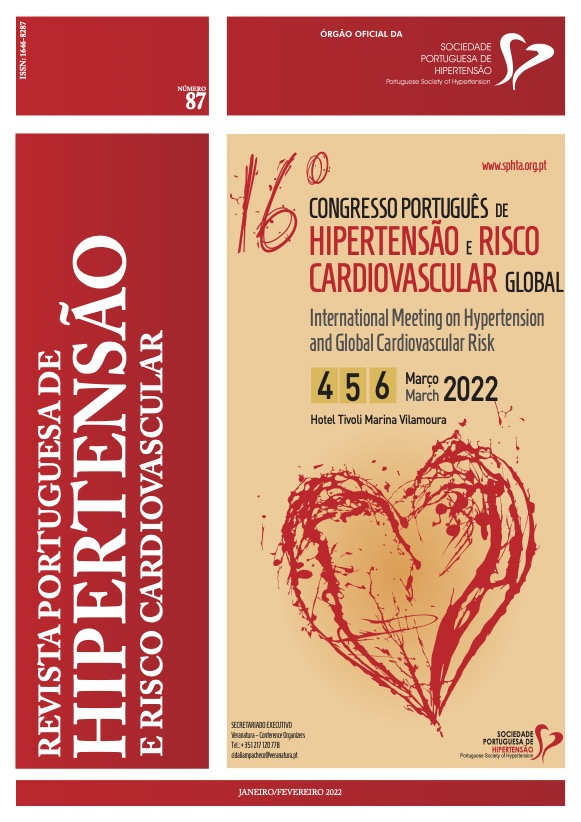ADHERENCE TO ANTIHYPERTENSIVE MEDICATION IN HEART FAILURE PATIENTS FOLLOWED IN A TERTIARY HOSPITAL CENTRE
DOI:
https://doi.org/10.58043/rphrc.4Keywords:
Heart Failure, Treatment Adherence and Compliance, Questionnaires, Antihypertensive Agents, MUAH-16Abstract
Introduction: Heart Failure is a cardiovascular syndrome resulting from a structural and/or functional anomaly of the cardiac muscle, resulting in reduced cardiac output and elevated intracardiac pressures. Adherence to antihypertensive therapy has a major influence on the outcomes of heart failure, not limited only to the treatment of high blood pressure, but also the regulation of the hydro-electrolytic balance and the reduction of cardiac workload. To achieve better outcomes, the identification of the main reasons underlying the low adherence rates to optimized HF medical therapy is necessary. Objective: This study aimed to evaluate heart failure patients’ adherence to antihypertensive therapy and associated causes for non-adherence.
Methods: Cross-sectional study conducted in the cardiology department of Coimbra ́s Tertiary Hospital. Between June 2019 and November 2019 all consecutive adult heart failure patients attending to the outpatient HF outpatient clinic, with a prescription of, at least, one antihypertensive agent, were invited to participate. This study was approved by the local Ethics Commission (CE 008-19). Socio-demographic and patient-related data were collected and the short version of Maastricht Utrecht Adherence in Hypertension, MUAH-16, was applied.
Results: A total of 125 patients were enrolled in the study, 72.8% males, with a mean age of 65.7 ± 1.7 years [62 with a blood pressure tendentially high or normal (HT) and 63 with low blood pressure (HoT)]. The mean score of MUAH-16 on the total sample was 93.4 ± 7. 5 (in a maximum of 112 points). Considering the mean scores of MUAH-16 subscales, being 28 points the maximum scoring, the results obtained were: positive attitude toward health care and medication: 25.9 ± 2.6; lack of discipline: 25.4 ± 3.5; aversion toward medication: 19.7 ± 4.7; active coping with health problems: 22.1 ± 3.3. Sub-group analysis shows no statistically significant differences between HT and HoT patients.
Conclusion: The studied population showed satisfactory levels of adherence to antihypertensive therapy, even so, improvements can be obtained if specific strategies to decrease aversion toward medication and to improve active coping with health problems are developed.
Downloads
References
Ponikowski, P. et al. 2016 ESC Guidelines for the diagnosis and treatment of acute and chronic heart failure. Eur. Heart J. 37, 2136–2137 (2016).
Ramrakha, Punit; Hill, J. Heart Failure. in Oxford Handbook of Cardiology 367–416 (Oxford University Press, 2012). doi:10.1136/adc.64.10.1520-a.
Rutten, F. H., Clark, A. L. & Hoes, A. W. How big a problem is heart failure with a normal ejection fraction? BMJ 353, 1–5 (2016).
Timmis, A. et al. European Society of Cardiology: Cardiovascular Disease Statistics 2019. European heart journal vol. 41 (2020).
Ponikowski, P. et al. Heart failure: preventing disease and death worldwide. ESC Hear. Fail. 1, 4–25 (2014).
Desvigne-Nickens, P. Heart failure prevention is the best option to stem high costs and disease burden research for more effective heart failure treatment is needed. Circ. Cardiovasc. Qual. Outcomes 4, 143–145 (2011).
Sabaté, Eduardo; Mendis, Shanti; Maribel, S. Adherence to Long-Term Therapies. OMS (2003).
Peacock, Erin; Krousel-wood, M. Adherence to Antihypertensive Therapy. Med Clin North Am. (2017) doi:10.1016/j.mcna.2016.08.005.
Zedler, B. K., Joyce, A., Murrelle, L., Kakad, P. & Harpe, S. E. A Pharmacoepidemiologic analysis of the impact of calendar packaging on adherence to self-administered medications for long-term use. Clin. Ther. 33, 581–597 (2011).
Dragomir,A.et al. Impact of adherence to antihypertensive agents on clinical outcomes and hospitalization costs. Med. Care 48, 418–425 (2010).
Corrao, G. et al. Adherence with antihypertensive drug therapy and the risk of heart failure in clinical practice. Hypertension 66, 742–749 (2015).
Dickson, V. V., Knafl, G. J. & Riegel, B. Predictors of medication nonadherence differ among black and white patients with heart failure. Res. Nurs. Heal. 38, 289–300 (2015).
Rasmussen, A. A. et al. Patient-reported outcomes and medication adherence in patients with heart failure. Eur. Hear. J. - Cardiovasc. Pharmacother. (2020) doi:10.1093/ ehjcvp/pvaa097.
Aggarwal, B., Pender, A., Mosca, L. & Mochari- Greenberger, H. Factors associated with medication adherence among heart failure patients and their caregivers. J. Nurs. Educ. Pract. 5, 22–27 (2014).
Wu, J. R., Moser, D. K., Chung, M. L. & Lennie, T. A. Predictors of Medication Adherence Using a Multidimensional Adherence Model in Patients With Heart Failure. J. Card. Fail. 14, 603–614 (2008).
Pallangyo, P. et al. Medication adherence and survival among hospitalized heart failure patients in a tertiary hospital in Tanzania: a prospective cohort study. BMC Res. Notes 13, 89 (2020).
Sadoh, W. E., Nwaneri, D. U. & Owobu, A. C. The cost of out-patient management of chronic heart failure in children with congenital heart disease. Niger. J. Clin. Pract. 14, 65–69 (2011).
Cabral, A. C., Castel-Branco, M., Caramona, M., Fernandez-Llimos, F. & Figueiredo, I. V. Developing an adherence in hypertension questionnaire short version: MUAH-16. J. Clin. Hypertens. 20, 118–124 (2018).
Ling, R. Z. Q., Jiao, N., Hassan, N. B., He, H. & Wang, W. Adherence to diet and medication and the associated factors among patient with chronic heart failure in a multi-ethnic society. Hear. Lung 49, 144–150 (2020).
Hugtenburg,J.G.,Timmers,L.,Elders,P.J.M.,Vervloet, M. & van Dijk, L. Definitions, variants, and causes of nonadherence with medication: A challenge for tailored interventions. Patient Prefer. Adherence 7, 675–682 (2013).





